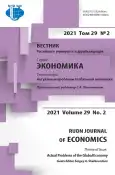Латиноамериканский регионализм и торговые соглашения с Евросоюзом: опыт и подходы
- Авторы: Тайар В.М.1
-
Учреждения:
- Институт Латинской Америки РАН
- Выпуск: Том 29, № 2 (2021): АКТУАЛЬНЫЕ ПРОБЛЕМЫ ГЛОБАЛЬНОЙ ЭКОНОМИКИ
- Страницы: 413-425
- Раздел: Экономическая интеграция и глобализация
- URL: https://journal-vniispk.ru/2313-2329/article/view/324229
- DOI: https://doi.org/10.22363/2313-2329-2021-29-2-413-425
- ID: 324229
Цитировать
Полный текст
Аннотация
Рассматриваются вопросы торгового сотрудничества между Евросоюзом и странами Латино-Карибской Америки (ЛКА). Представлена характеристика межрегиональной торговли, анализируется торговое взаимодействие между ЕС и субрегиональными интеграционными блоками ЛКА. Показано, что латиноамериканский регионализм предопределяет подходы ЕС к торгово-экономическому сотрудничеству с ЛКА. Отмечается, что, несмотря на разноформатность латиноамериканской интеграции и ее отличие от европейской интеграционной модели, Евросоюзу удается поддерживать торгово-экономические связи с субрегиональными объединениями и отдельными странами ЛКА в условиях растущей конкуренции в этом регионе с США и Китаем.
Об авторах
Виолетта Макариосовна Тайар
Институт Латинской Америки РАН
Автор, ответственный за переписку.
Email: vtayar@mail.ru
кандидат экономических наук, заместитель директора
Российская Федерация, 115035, Москва, ул. Большая Ордынка, д. 21/16Список литературы
- Butorina, O. (2020). The shrinking of the European Union and its integration capability. Contemporary Europe, (2), 20-32. https://doi.org/10.15211/soveurope220202032
- Butorina, O.V., & Kaveshnikov, N.Yu. (Eds.) (2016). European integration. 2nd ed., rev. Moscow, Aspect Press. (In Russ.)
- Caetano, G., & Pose, N. (2020). La debilidad de los regionalismos latinoamericanos frente a los escenarios actuales. Notas para el debate. Documentos de Trabajo No. 41. Madrid, Fundación Carolina. (In Spanish.)
- CEPAL. (2021). Perspectivas del Comercio Internacional de América Latina y el Caribe, 2020. Santiago. (In Spanish.)
- Domínguez, R. (2020). La resiliencia en la modernización del acuerdo global UE - México. Análisis Carolina (no. 45). Madrid, Fundación Carolina. (In Spanish.)
- Hänggi, H., Roloff, R., & Rüland, J. (2006). Interregionalism and international relations. London, Routledge.
- Hernández, B. (2020). Quinse años del acuerdo de asociación UE - Chile: Hacia una modernización necesaria. Análisis Carolina (no. 48). Madrid, Fundación Carolina. (In Spanish.)
- Hettne, B., & Söderbaum, F. (2000). Theorizing the rise of regioness. New Political Economy, 5(3), 457-473.
- Kanunnikov, A.A. (2014). European Union - Latin America: Economic, political, social cooperation. Moscow, The Institute of Europe of the Russian Academy of Sciences. (In Russ.)
- Khesin, E. (2020). Economy of the European Union: A decade after the crisis. World Economy and International Relations, 64(1), 73-81. (In Russ.) https://doi.org/10.20542/0131-22272020-64-1-73-81
- Neimark, M. (2018). The crisis of the liberal model of the world order and the future of the EU. Contemporary Europe, 18(1), 26-35. (In Russ.) https://doi.org/10.15211/soveurope120182635
- Razumovskii, D. (2015). Latin American integration and extra-region cooperation. Prospects for Russia. World Economy and International Relations, (8), 82-91. (In Russ.) https://doi.org/10.20542/0131-2227-2015-8-82-91
- Razumovskij, D.V. (2016). Trade cooperation between Latin America and extraregional partners. Latinskaja Amerika, (3), 5-21. (In Russ.)
- Rosales, O. (2020). Economía y geopolítica en América Latina: La urgencia de estrechar vínculos con la Unión Europea. Documentos de Trabajo No. 30. Madrid, Fundación Carolina. (In Spanish.)
- Sidorenko, T. (2020). El acuerdo comercial entre la Unión Europea y el MERCOSUR como medio de promoción de los negocios nacionales. Iberoamérica, (2), 49-65. (In Spanish.)
- Sudarev, V. (2019). Política latinoamericana de Donald Trump. Iberoamérica, (1), 5-24. (In Spanish.)
- Tayar, V. (2019). The European Union and Latin America in the context of interregional interaction. Contemporary Europe, (4), 16-26. http://dx.doi.org/10.15211/soveurope420191626
- Tayar, V. (2020). EU - Latin America: Towards a constructive model of partnership. Contemporary Europe, (6), 90-100. http://dx.doi.org/10.15211/soveurope6202090100
- Tayar, V. (2020). La Unión Europea y América Latina: El desarrollo sostenible con hincapié en la ecologia. Iberoamérica, (3), 72-97. (In Spanish.)
- Trade Map. (2020). Trade statistics for international business development. Retrieved January 12, 2021, from https://www.trademap.org
- Vardomsky, L.B., Zevin, L.Z., Sokolova, T.V., Pylin, A.G., Kheifets, B.A., Migranyan, A.A.,. & Fokina, L.V. (2019). Eurasian integration in a turbulent world. Aleteiya Publ. (In Russ.)
- Yakovlev, P. (2020). Risks of a global recession in the face of globalization crisis. World Economy and International Relations, 64(2), 5-14. (In Russ.) https://doi.org/10.20542/01312227-2020-64-2-5-14
- Yakovlev, P.P. (2017). Integration in Latin America: Centripetal and centrifugal trends. The contours of global transformations: Politics, economics, law, 10(4), 86-100.
- Yakovlev, P.P. (2020). Latin American models of participation in globalization: Regional traits and country’s features. Rossija i Sovremennyj Mir, 2(107), 135-157. (In Russ.) http://dx.doi.org/10.31249/rsm/2020.02.08
Дополнительные файлы









